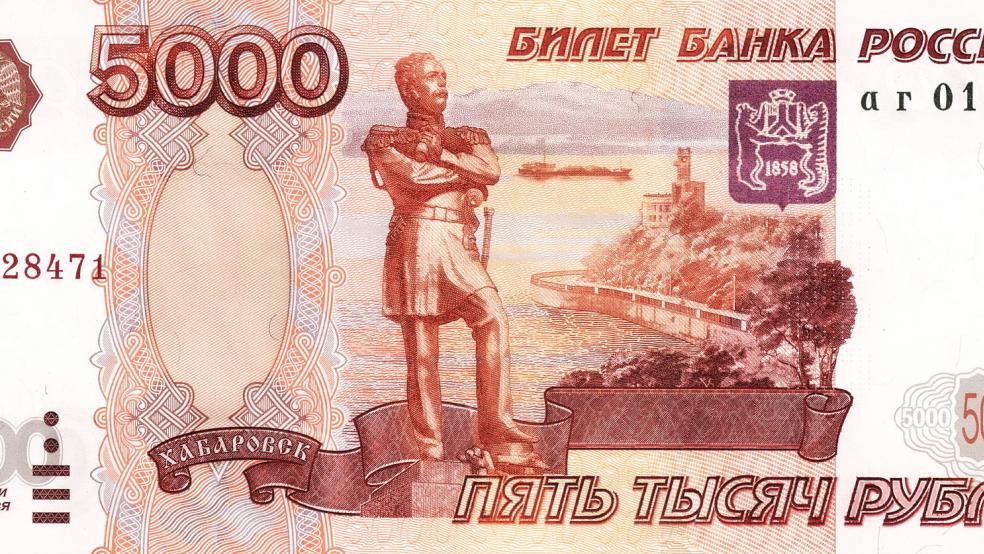If Bloomberg News were to report tomorrow morning that the United States government was considering enacting capital controls to prevent investors from moving assets out of the country, markets may well shrug it off because the idea is patently absurd. The entity taking the biggest hit would be Bloomberg, and the damage would be reputational — for reporting a story nobody believed.
However, when Bloomberg reported on Tuesday that the Russian central bank was considering capital controls, the markets reacted violently, and the value of the ruble compared to major foreign currencies plummeted to a record low.
Related: A Radical Way for Ukraine to Fight and Defeat Russia
The Russian central bank immediately denied that capital controls are under discussion, and the ruble recovered somewhat. But the market’s reaction revealed a vital truth: The idea that Russia could be considering measures to lock up wealth held within its borders is really quite credible.
The U.S. and its European allies instituted sanctions against Russia when pro-Russian forces invaded Ukraine’s Crimean peninsula this summer, and gradually escalated the severity of the sanctions as Vladimir Putin’s government overtly aided in the violent attempt by Ukrainian separatists to declare an independent republic that would have been beholden to Russia.
The sanctions didn’t excite too much public interest in the West when they were instituted. Restricting U.S. banks from doing business with some Russian banks and placing limitations on trade in Europe doesn’t make for great headlines.
The impact of the sanctions, though, has been cumulative and significant. Investors are concerned that they can’t make money by investing in Russia, and are also worried that Putin’s government might start taking steps to lock up their funds within the Russian Federation. As a result, even before the Bloomberg report on Tuesday, Russia was expected to lose between $100 and $120 billion in capital this year purely due to investors fleeing the country.
Related: Why China Is the Real Winner in Ukraine and Iraq
Capital flight, as the phenomenon is known, can have a hugely destabilizing effect on a nation’s economy, as it reduces investment, tax receipts and economic growth.
Analysts who monitor the Russian economy say that capital controls really aren’t on the table in the immediate future — mainly because they would likely do more harm than good. Alexander Kliment, director of emerging market strategy for the Eurasia Group, wrote Wednesday that, “[d]espite high capital flight and pressure on the ruble, [the Russian central bank] will not impose cross border capital controls at this stage — the regulator perceives the risks to investor confidence as too high.”
Elvira Nabiullina, head of Russia’s central bank, has been pushing the institution toward a philosophy more similar to the U.S. Federal Reserve’s, in which managing the money supply in order to control inflation is the bank’s primary goal. Progress in that direction would be severely reversed by a move to constrain the free flow of capital.
Related: Don’t Expect NATO to Ante Up the Money for Ukraine
Kliment said that milder measures meant to protect the value of the ruble might be taken in the near term, but that they would likely only affect Russian companies, not foreign investors. However, he added, “[m]ore severe capital controls that would affect the operations of foreign investors are a growing possibility, on the assumption that the Ukraine crisis will not, in fact, reach a sustainable resolution in the near future.”
The question for the Russian economy now is whether it can wait out Western resolve to punish Putin for his aggression. The most recent news suggests that the wait may be a long one. The Russian leader has been making ever more bellicose statements, not just about Ukraine, but about former Russian states in the Baltics.
At a press conference this week, German Chancellor Angela Merkel said that the U.S. and its European allies should be prepared for economic conflict that lasts decades. That’s bad news for everyone, but the economy likely to suffer the most damage is Russia’s.
Top Reads from The Fiscal Times:





